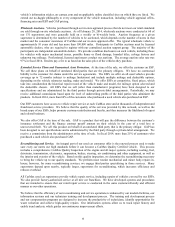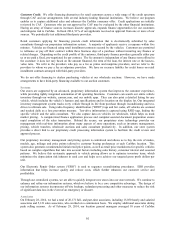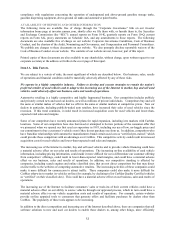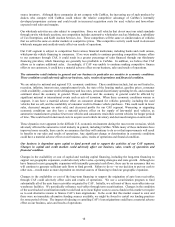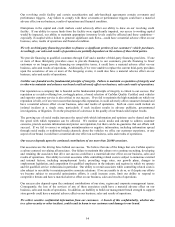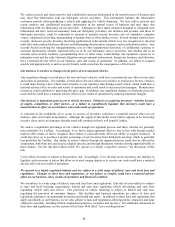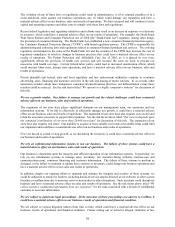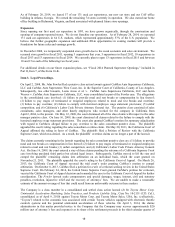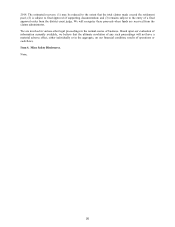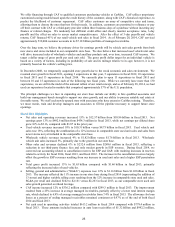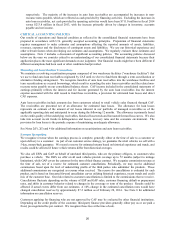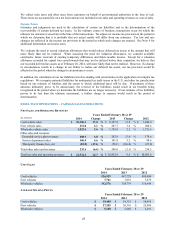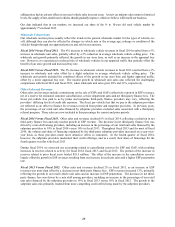CarMax 2014 Annual Report Download - page 23
Download and view the complete annual report
Please find page 23 of the 2014 CarMax annual report below. You can navigate through the pages in the report by either clicking on the pages listed below, or by using the keyword search tool below to find specific information within the annual report. 19
As of February 28, 2014, we leased 57 of our 131 used car superstores, our new car store and our CAF office
building in Atlanta, Georgia. We owned the remaining 74 stores currently in operation. We also owned our home
office building in Richmond, Virginia, and land associated with planned future store openings.
Expansion
Since opening our first used car superstore in 1993, we have grown organically, through the construction and
opening of company-operated stores. We do not franchise our operations. As of February 28, 2014, we operated
131 used car superstores in 64 U.S. markets, which represented approximately 57% of the U.S. population. We
believe that further geographic expansion and additional fill-in opportunities in existing markets will provide a
foundation for future sales and earnings growth.
In December 2008, we temporarily suspended store growth due to the weak economic and sales environment. We
resumed store growth in fiscal 2011, opening 3 superstores that year, 5 superstores in fiscal 2012, 10 superstores in
fiscal 2013 and 13 superstores in fiscal 2014. We currently plan to open 13 superstores in fiscal 2015 and between
10 and 15 in each of the following two fiscal years.
For additional details on our future expansion plans, see “Fiscal 2014 Planned Superstore Openings,” included in
Part II, Item 7, of this Form 10-K.
Item 3. Legal Proceedings.
On April 2, 2008, Mr. John Fowler filed a putative class action lawsuit against CarMax Auto Superstores California,
LLC and CarMax Auto Superstores West Coast, Inc. in the Superior Court of California, County of Los Angeles.
Subsequently, two other lawsuits, Leena Areso et al. v. CarMax Auto Superstores California, LLC and Justin
Weaver v. CarMax Auto Superstores California, LLC, were consolidated as part of the Fowler case. The allegations
in the consolidated case involved: (1) failure to provide meal and rest breaks or compensation in lieu thereof;
(2) failure to pay wages of terminated or resigned employees related to meal and rest breaks and overtime;
(3) failure to pay overtime; (4) failure to comply with itemized employee wage statement provisions; (5) unfair
competition; and (6) California’s Labor Code Private Attorney General Act. The putative class consisted of sales
consultants, sales managers, and other hourly employees who worked for the company in California from
April 2, 2004, to the present. On May 12, 2009, the court dismissed all of the class claims with respect to the sales
manager putative class. On June 16, 2009, the court dismissed all claims related to the failure to comply with the
itemized employee wage statement provisions. The court also granted CarMax's motion for summary adjudication
with regard to CarMax's alleged failure to pay overtime to the sales consultant putative class. The plaintiffs
appealed the court's ruling regarding the sales consultant overtime claim. On May 20, 2011, the California Court of
Appeal affirmed the ruling in favor of CarMax. The plaintiffs filed a Petition of Review with the California
Supreme Court, which was denied. As a result, the plaintiffs’ overtime claims are no longer a part of the lawsuit.
The claims currently remaining in the lawsuit regarding the sales consultant putative class are: (1) failure to provide
meal and rest breaks or compensation in lieu thereof; (2) failure to pay wages of terminated or resigned employees
related to meal and rest breaks; (3) unfair competition; and (4) California’s Labor Code Private Attorney General
Act. On June 16, 2009, the court entered a stay of these claims pending the outcome of a California Supreme Court
case involving unrelated third parties but related legal issues. Subsequently, CarMax moved to lift the stay and
compel the plaintiffs’ remaining claims into arbitration on an individual basis, which the court granted on
November 21, 2011. The plaintiffs appealed the court’s ruling to the California Court of Appeal. On March 26,
2013, the California Court of Appeal reversed the trial court’s order granting CarMax’s motion to compel
arbitration. On October 8, 2013, CarMax filed a petition for a writ of certiorari seeking review in the United States
Supreme Court. On February 24, 2014, the United States Supreme Court granted CarMax's petition for certiorari,
vacated the California Court of Appeal decision and remanded the case to the California Court of Appeal for further
consideration. The Fowler lawsuit seeks compensatory and special damages, wages, interest, civil and statutory
penalties, restitution, injunctive relief and the recovery of attorneys’ fees. We are unable to make a reasonable
estimate of the amount or range of loss that could result from an unfavorable outcome in these matters.
The Company is a class member in a consolidated and settled class action lawsuit (In Re Toyota Motor Corp.
Unintended Acceleration Marketing, Sales Practices, and Products Liability Litig., Case No. 10-2151 (C.D. Cal.),
consolidated as of April 9, 2010) against Toyota Motor Corp. and Toyota Motor Sales, USA, Inc. (collectively,
“Toyota”) related to the economic loss associated with certain Toyota vehicles equipped with electronic throttle
controls systems and the potential unintended acceleration of these vehicles. On April 3, 2014, the claims
administrator in this matter provided notice to the Company that the Company may recover approximately $20
million (net of attorney’s fees and expenses) as its share of the settlement proceeds in the third calendar quarter of


